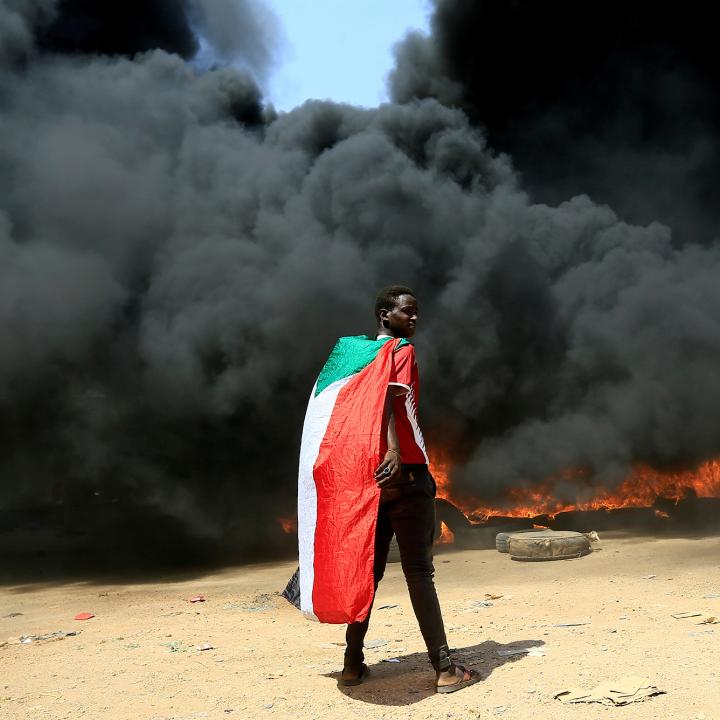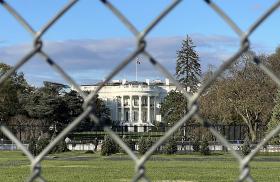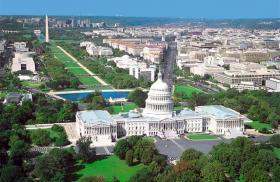
- Policy Analysis
- PolicyWatch 4069
To Resolve Sudan’s Conflict, Merge the Jeddah and Quad Tracks

The best way to bolster the Trump administration’s new “Quad” initiative is by combining it with a previous Saudi-American platform that already has significant buy-in from the warring parties.
On June 3, representatives from Egypt, Saudi Arabia, and the United Arab Emirates met with U.S. Deputy Secretary of State Christopher Landau and Senior Advisor for Africa Massad Boulos, marking a new Trump administration initiative to end the conflict in Sudan. These “Quad for Sudan” talks generated considerable momentum, with Egyptian President Abdul Fattah al-Sisi subsequently visiting Emirati President Muhammad bin Zayed in Abu Dhabi for further discussions. Now that they have demonstrated consensus on addressing the conflict, the Quad partners should incorporate useful elements from the existing Jeddah Platform, a Saudi-American initiative supported by the African Union and the Intergovernmental Authority on Development (IGAD).
Shared Strategic Concerns
Sudan’s current civil war erupted on April 15, 2023, amid tensions between the Sudanese Armed Forces (SAF) led by Gen. Abdel Fattah al-Burhan and the Rapid Support Forces (RSF) led by Mohamed Hamdan “Hemedti” Dagalo. The situation escalated following the collapse of the 2022 Framework Agreement, which had attempted to guide the country’s democratic transition. Armed clashes spread from Khartoum to Darfur and beyond, creating a major humanitarian catastrophe with over 150,000 deaths and around 13 million displaced persons. Both sides committed grave human rights violations, including indiscriminate attacks, sexual violence, and acts of genocide.
As the conflict enters its third year, the SAF holds the upper hand in Khartoum while the RSF maintains control over the western part of the country and has attempted to establish parallel governance there. The situation is complicated by foreign involvement: reports indicate Emirati support for the RSF, while the SAF receives backing from Egypt and elements of the former Omar al-Bashir regime. (Cairo and Abu Dhabi both deny these allegations.)
All four Quad nations—Egypt, Saudi Arabia, the UAE, and the United States—have an urgent interest in addressing the shared security concerns arising from this ongoing deterioration. The Sudan conflict generates cascading regional threats that include mass refugee displacement, illicit arms trafficking, expanding terrorist activity, potential “violence contagion” across the Sahel and African Great Lakes regions, and the resurgence of Muslim Brotherhood elements and former Bashir regime operatives, who retain substantial influence in Sudan’s military hierarchy while actively promoting their ideology online.
The other Quad countries also share Washington’s concern that the Sudan vacuum could enable hostile external powers—primarily Russia and Iran—to increase their influence and interfere with peacemaking efforts. Indeed, Sudan’s institutional collapse may provide an opportunity for these powers to expand their security and economic presence, whether through local proxies or direct military and financial arrangements in the Red Sea and surrounding regions.
In March 2024, Moscow signed an agreement with the SAF to establish a Red Sea naval base. Yet it simultaneously supported the RSF, enabling Moscow to benefit regardless of the conflict’s outcome.
Similarly, Iran intensified its involvement after October 2023, resuming relations with Khartoum and providing advanced Mohajer-6 drones via flights by Qeshm Fars Air, a transportation firm linked to the Islamic Revolutionary Guard Corps. Tehran also sent Ababil drones, which the SAF have modified and renamed the “Zagel-3.” These transfers occurred repeatedly at Port Sudan International Airport between December 2023 and January 2024.
Iran’s Sudan engagement was largely spurred by its declining regional influence amid internal economic pressures and reduced proxy capabilities across the Middle East. These and other setbacks prompted a desperate search for new East African footholds to compensate for Tehran’s strategic losses elsewhere.
Arab leaders—not to mention the United States and Israel—have a strong interest in preventing Sudan from becoming a pivot point for the Iran-Russia axis. The paramount goal for Cairo, Riyadh, and Abu Dhabi is to prevent Bashir-era remnants and other Islamist forces from returning to power—partly due to concerns about the potential rise of Islamist movements in their own countries, but also because these elements maintained close relations with Iran and allowed Sudan to be used as a training ground for Hezbollah, Hamas, and al-Qaeda elements. This shared Arab commitment transcends their bilateral differences and often-competing regional priorities, creating a rare diplomatic foundation for coordinated action. To build on this foundation, Washington should take the lead in merging the Jeddah and Quad mechanisms, transforming fragmented diplomatic efforts into a more unified and effective approach.
Sorting Out the Existing Diplomatic Tracks
First launched in May 2023, the Jeddah Platform brought the parties to the table for indirect negotiations focusing on humanitarian issues. The platform lacked binding implementation mechanisms, and its results were limited (primarily humanitarian ceasefire commitments). Yet it retains legitimacy among key Sudanese actors, especially the SAF.
In late 2024, U.S. Special Envoy Tom Perriello initiated another diplomatic framework based in Geneva. Yet the resulting talks excluded key Sudanese actors and were boycotted by the SAF, who objected to the UAE’s involvement. While the Geneva process aimed to include regional stakeholders and broaden international engagement, it failed to bring the main warring parties to the table.
In contrast, the Jeddah Platform has not been boycotted by either party and is more proximal to them—geographically and politically—than a Europe-based framework. Meanwhile, the new Quad track offers diplomatic weight and the ability to enforce commitments. Merging the two tracks would create a hybrid mechanism that marries on-the-ground credibility with international pressure—a necessary formula for meaningful progress.
Policy Recommendations
To combine the Quad and Jeddah tracks, keep the regional players unified, and maximize their effectiveness, Washington should spearhead the following measures:
- Joint political declaration: The Quad members, the African Union, IGAD, and other relevant players should issue a declaration that the Jeddah Platform will henceforth be the sole venue for resolving Sudan’s conflict, with participation by the Quad countries.
- Unified administrative structure: A joint executive secretariat should be established in Jeddah, including Quad representatives, the UN, the African Union, and Sudanese civil society figures.
- Legally binding authority: The Jeddah declaration should be converted into a binding political agreement through a UN Security Council resolution, which would empower the unified platform with international legal status. This requires engaging with UN envoy Ramtane Lamamra to ensure participation and joint planning with regional Quad members, nested within a broader international framework that supports collective planning and implementation of a political process.
- Civil society integration: To prevent domestic military forces or foreign powers from dominating the political process, Sudanese civil society needs to be fully represented, including NGOs, tribal representatives, minorities, and political factions. This would align with the traditional U.S. expectation of democratic civilian governance as a prerequisite for aid and support.
Notably, these recommendations would also take advantage of a uniquely favorable regional moment—one that may not arise again. The decline in Iran’s influence has opened a rare strategic window to act decisively, but it will not stay open forever. In addition to the humanitarian imperative of responding to Sudan’s tragic internal dynamics, the country will be a pivotal player in the region’s nascent realignment. Officials should not forget that before the civil war, Khartoum was on track to normalize relations with Israel under the Abraham Accords. Coupled with progress toward a stable, democratic Sudan, normalization would have a wide range of strategic benefits: further weakening Iran’s standing; helping with the difficult challenge of securing Red Sea shipping lanes; complementing Israel’s growing integration with Arab nations; bolstering the region’s evolving security architecture; and reinforcing the corridor of pro-Western, stability-oriented states from the Arabian Peninsula through the Horn of Africa.
If Washington and its partners fail to address Sudan’s crisis, however, they risk widening a dangerous power vacuum that could easily be filled by Iran or other hostile actors. In short, stabilizing Sudan is not just a humanitarian or diplomatic priority; it is a strategic necessity.
Areig Elhag is the Arabic content editor at The Washington Institute and former producer of the award-winning television program Between Two Niles, focusing on Sudan’s political landscape, human rights, and regional diplomacy.



